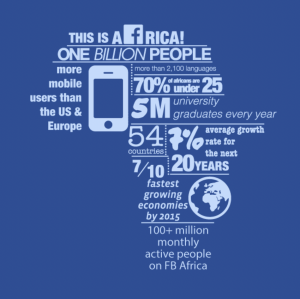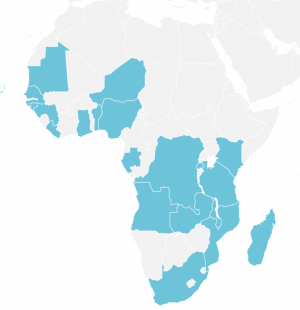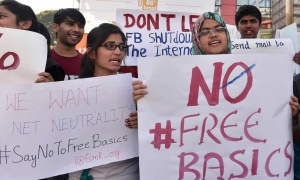Difference between revisions of "Facebook in Africa"
| Line 1: | Line 1: | ||
[[File:FacebookAfrica.png|300px|thumbnail|right|Facebook's initiative in Africa]] | [[File:FacebookAfrica.png|300px|thumbnail|right|Facebook's initiative in Africa]] | ||
| − | {{initial|F}} acebook in Africa has a whole different meaning than Facebook does in the modern western world. There are roughly 139 million users of Facebook per month in Africa, and around 98% of | + | {{initial|F}} acebook in Africa has a whole different meaning than Facebook does in the modern western world. There are roughly 139 million users of Facebook per month in Africa, and around 98% of them are connected via mobile devices as Africa remains the fasted growing region in mobile advancement. <ref name=Toby>Shapshak, Toby. Almost All of Facebook’s 139 Million users in Africa Are On Mobile. Forbes. December 18th 2018. https://www.forbes.com/sites/tobyshapshak/2018/12/18/almost-all-of-facebooks-139m-users-in-africa-are-on-mobile/#3ab2bd5d68e7.</ref> This means that the vast majority of Africa’s population and Facebook users view the site on a small black and white screen. Africa’s access to mobile phones has made it possible for citizens to communicate, obtain mobile banking accounts, and have limited access to internet services, ultimately completely “leapfrogging” landline telephony. <ref>The Economist. In much of sub-Sahran Africa, mobile phones are more common than access to electricity. November 8, 2017. https://www.economist.com/graphic-detail/2017/11/08/in-much-of-sub-saharan-africa-mobile-phones-are-more-common-than-access-to-electricity</ref> For us in America, Facebook is considered a social media website that allows us to connect to old friends and share content, but for the entirety of the African continent, Facebook is the giant that spearheaded their movement towards free internet by founding Free Basics. |
| Line 9: | Line 9: | ||
==Controversies== | ==Controversies== | ||
===Online Behavior=== | ===Online Behavior=== | ||
| − | + | Facebook and internet users in Africa have significantly less experience than users in America - with this comes the need to teach about digital etiquette. The idea of privacy, information transparency, fake news, digital embodiment are all foreign concepts to early internet users. The initial purpose according to Zuckerberg was to offer users “the opportunity to access news, health information and services for free.”<ref name=Shearlaw> Shearlaw, Maeve. Facebook Lures Africa with free internet – but what is the hidden cost? The Guardian. August 1st 2016. https://www.theguardian.com/world/2016/aug/01/facebook-free-basics-internet-africa-mark-zuckerberg</ref> However, the idea that users will only be searching for news and health information is a naïve approach to solving the problem. Instead, users are considered passive consumers since they only obtained a small portion of information due to the limited availability of information provided by the service. When searching news, users will react to articles with clickbait headlines and not be able to fully sift through the news topic and obtain a well rounded view of the issue. For these types of users, fake news becomes a monumentous issue in Africa. As Frankfurt stated in his article “On Truth, Lies, and Bullshit” a lie is “designed to prevent us from being in touch with what is really going on.” <ref> Frankfurt, Harry. “On Truth, Lies, and Bullshit.” The Philosophy of Deception, by Clancy W. Martin, Oxford University Press, 2009.</ref> In this sense, Free Basics’s goal of providing clarity, information, and accessibility to a huge population of people can often backfire by causing users who are extremely uneducated in spotting fake news to believe falsities rather than find answers to news or health questions. Furthermore as Africa is a continent where there are very few protections for digital privacy and laws about freedom of online expression, it has become a concern of many governments that Facebook is exploiting Africa’s lack of technical literacy to drive their business and profits. After failed efforts in Myanmar to protect users safety online, Facebook wrote that they were initially too “idealistic” in their efforts. They claim that moving forward they “have invested in people and technology to build better safeguards,” including fact-checking and support for digital literacy efforts around the globe. <ref name=Tiku /> | |
===Digital Colonialism and Net Neutrality=== | ===Digital Colonialism and Net Neutrality=== | ||
Facebook has also experienced extreme backlash as opponents of Free Basics claim that the movement and services are considered digital colonialism and violate net neutrality. Digital colonialism in this context is the idea that Facebook maintains control over the digital lives of Africa’s population, masking their profit motives as a philanthropic gesture. The content that is viewable with the service is mostly western corporate news and ideologies. Many citizens in Africa have voiced that the articles they are able to read with Free Basics are not articles that they have any interest in. <ref name=Solon /> In this sense, Facebook has power over the content that billions of users can read, and the content is largely dominated by western ideas revealing an eerie view into the colonial past. | Facebook has also experienced extreme backlash as opponents of Free Basics claim that the movement and services are considered digital colonialism and violate net neutrality. Digital colonialism in this context is the idea that Facebook maintains control over the digital lives of Africa’s population, masking their profit motives as a philanthropic gesture. The content that is viewable with the service is mostly western corporate news and ideologies. Many citizens in Africa have voiced that the articles they are able to read with Free Basics are not articles that they have any interest in. <ref name=Solon /> In this sense, Facebook has power over the content that billions of users can read, and the content is largely dominated by western ideas revealing an eerie view into the colonial past. | ||
[[File:antifreebasics.jpg|300px|thumbnail|right|Protesters against Free Basics]] | [[File:antifreebasics.jpg|300px|thumbnail|right|Protesters against Free Basics]] | ||
| − | Facebook has also been criticized for violating net neutrality, which is the principle that internet service providers should treat all users, content, and websites equally. <ref> Net neutrality https://en.wikipedia.org/wiki/Net_neutrality</ref>Net neutrality is an often debated subject as some people believe that large | + | Facebook has also been criticized for violating net neutrality, which is the principle that internet service providers should treat all users, content, and websites equally. <ref> Net neutrality https://en.wikipedia.org/wiki/Net_neutrality</ref>Net neutrality is an often debated subject as some people believe that large technology companies should be allowed to charge different prices for their content or for faster speeds. Facebook has been accused of following the “freemium to premium” model as they introduced this free internet service to customers around the continent of Africa and then plan to offer premium services for increased access. For these reasons, and the fact that Free Basics gave Facebook too much control over internet access, it has been banned in India. A similar story is expected to happen in some parts of Africa if Facebook does not address these concerns. |
==See Also== | ==See Also== | ||
Revision as of 19:15, 15 March 2019
Contents
Free Basics
History
Free Basics is a Facebook-developed mobile application which gives users in Africa a glimpse at internet access. Free Basices, originally named Internet.org was launched in 2013 with the purpose to give affordable internet access to selected less developed countries. [3] It provides a set of websites free of mobile data charges that users can access. These websites are often stripped of photos and videos, only leaving plain text behind. [4]Africa became a good target for these services as the majority of people on the continent have more access to mobile phones than electricity. [5] However with the introduction of the internet to billions of people comes many controversies.
Controversies
Online Behavior
Facebook and internet users in Africa have significantly less experience than users in America - with this comes the need to teach about digital etiquette. The idea of privacy, information transparency, fake news, digital embodiment are all foreign concepts to early internet users. The initial purpose according to Zuckerberg was to offer users “the opportunity to access news, health information and services for free.”[6] However, the idea that users will only be searching for news and health information is a naïve approach to solving the problem. Instead, users are considered passive consumers since they only obtained a small portion of information due to the limited availability of information provided by the service. When searching news, users will react to articles with clickbait headlines and not be able to fully sift through the news topic and obtain a well rounded view of the issue. For these types of users, fake news becomes a monumentous issue in Africa. As Frankfurt stated in his article “On Truth, Lies, and Bullshit” a lie is “designed to prevent us from being in touch with what is really going on.” [7] In this sense, Free Basics’s goal of providing clarity, information, and accessibility to a huge population of people can often backfire by causing users who are extremely uneducated in spotting fake news to believe falsities rather than find answers to news or health questions. Furthermore as Africa is a continent where there are very few protections for digital privacy and laws about freedom of online expression, it has become a concern of many governments that Facebook is exploiting Africa’s lack of technical literacy to drive their business and profits. After failed efforts in Myanmar to protect users safety online, Facebook wrote that they were initially too “idealistic” in their efforts. They claim that moving forward they “have invested in people and technology to build better safeguards,” including fact-checking and support for digital literacy efforts around the globe. [5]
Digital Colonialism and Net Neutrality
Facebook has also experienced extreme backlash as opponents of Free Basics claim that the movement and services are considered digital colonialism and violate net neutrality. Digital colonialism in this context is the idea that Facebook maintains control over the digital lives of Africa’s population, masking their profit motives as a philanthropic gesture. The content that is viewable with the service is mostly western corporate news and ideologies. Many citizens in Africa have voiced that the articles they are able to read with Free Basics are not articles that they have any interest in. [4] In this sense, Facebook has power over the content that billions of users can read, and the content is largely dominated by western ideas revealing an eerie view into the colonial past.
Facebook has also been criticized for violating net neutrality, which is the principle that internet service providers should treat all users, content, and websites equally. [8]Net neutrality is an often debated subject as some people believe that large technology companies should be allowed to charge different prices for their content or for faster speeds. Facebook has been accused of following the “freemium to premium” model as they introduced this free internet service to customers around the continent of Africa and then plan to offer premium services for increased access. For these reasons, and the fact that Free Basics gave Facebook too much control over internet access, it has been banned in India. A similar story is expected to happen in some parts of Africa if Facebook does not address these concerns.
See Also
References
- ↑ Shapshak, Toby. Almost All of Facebook’s 139 Million users in Africa Are On Mobile. Forbes. December 18th 2018. https://www.forbes.com/sites/tobyshapshak/2018/12/18/almost-all-of-facebooks-139m-users-in-africa-are-on-mobile/#3ab2bd5d68e7.
- ↑ The Economist. In much of sub-Sahran Africa, mobile phones are more common than access to electricity. November 8, 2017. https://www.economist.com/graphic-detail/2017/11/08/in-much-of-sub-saharan-africa-mobile-phones-are-more-common-than-access-to-electricity
- ↑ Free Basics/Internet.org https://en.wikipedia.org/wiki/Internet.org
- ↑ 4.0 4.1 Solon, Olivia. 'It's digital colonialism': how Facebook's free internet service has failed its users. The Guardian. July 27, 2017. https://www.theguardian.com/technology/2017/jul/27/facebook-free-basics-developing-markets.
- ↑ 5.0 5.1 Tiku, Nitasha. After Troubles in Myanmar, Facebook Charges Ahead In Africa. Wired. October 7th 2018. https://www.wired.com/story/after-troubles-myanmar-facebook-charges-ahead-africa/.
- ↑ Shearlaw, Maeve. Facebook Lures Africa with free internet – but what is the hidden cost? The Guardian. August 1st 2016. https://www.theguardian.com/world/2016/aug/01/facebook-free-basics-internet-africa-mark-zuckerberg
- ↑ Frankfurt, Harry. “On Truth, Lies, and Bullshit.” The Philosophy of Deception, by Clancy W. Martin, Oxford University Press, 2009.
- ↑ Net neutrality https://en.wikipedia.org/wiki/Net_neutrality


